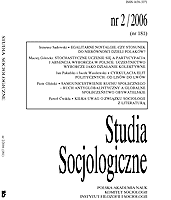Stochastyczne uczenie się a partycypacja i absencja wyborcza w Polsce: uczestnictwo wyborcze jako działanie kolektywne
Stochastic Learning and Electoral Participation and Abstention in Poland: Electoral Participation As Collective Action
Author(s): Maciej GóreckiSubject(s): Social Sciences
Published by: Instytut Filozofii i Socjologii Polskiej Akademii Nauk
Keywords: electoral participation/abstention; „paradox of voter turnout”; stochastic learning; „bandwagon effect”
Summary/Abstract: The paper has two aims. First, it is a presentation of Satoshi Kanazawa’s model of voting behaviour, a theory of voting based on principles of stochastic learning. The model, drawing on Michael W. Macy’s general theory of stochastic learning, is an attempt at resolution of the so-called „paradox of voter turnout”, one of the most inconvenient puzzles of rational choice theory. Second, in the article Kanazawa’s main propositions are applied to the phenomenon of participation and abstention in the parliamentary elections of 1991 and 1997 in Poland. Using Polish General Social Surveys data I present evidence suggesting partial suitability of Kanazawa’s theory for the analysis of electoral participation and abstention in Poland. The model, emphasising past voting behaviour as a determinant of participation and abstention, has, however, serious limitations which I show using the case of the 1997 parliamentary election. At the same time, referring to the research on the so-called „bandwagon effect”, I propose an extension of Kanazawa’s theory. The research on the „bandwagon effect” indicates that voters may also refer to future elections and this may distort the process of stochastic learning. In this context, Kanazawa’s proposition appears incomplete and unfinished which makes room for further research.
Journal: Studia Socjologiczne
- Issue Year: 181/2006
- Issue No: 2
- Page Range: 53-79
- Page Count: 26
- Language: Polish

